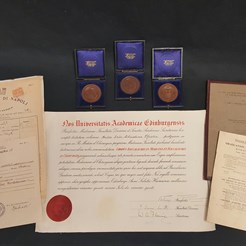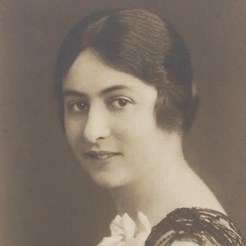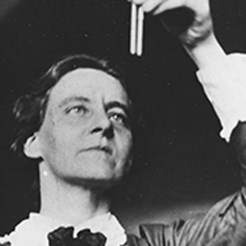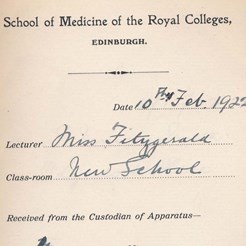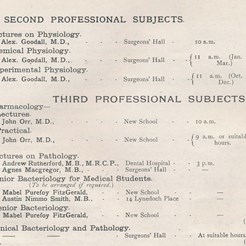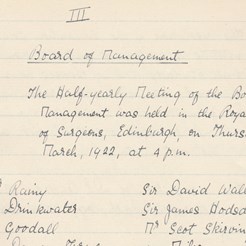In recent years there has been a significant effort to recover the stories of women in science and medicine, both those who were never recognised in their time and those who were, but have been largely forgotten. We would like to highlight two women, Mabel Purefoy Fitzgerald and Ines Pfister, both active in science and medicine in 1920s Edinburgh.
In 1972, former physiologist and clinical pathologist Mabel Purefoy FitzGerald* (1872-1973) belatedly became an Oxford graduate at 100 years old. Eighty years earlier, Fitzgerald had not only studied science and medicine unofficially and in collusion with some of the most distinguished Oxford scientists, but also impressed the neurophysiologist Francis Gotch so much that he later had the regulations concerning female students altered. Gender prohibited Mabel from studying for a qualification in Oxford when she moved there in the 1890s. Yet, by the early 1900s she had launched a career in laboratory medical science and would produce ground-breaking research on the role of oxygen in breathing. This included Royal Society publications, written jointly with the well-known Scottish physiologist John Scott Haldane in 1905, and also on her own in 1913 and 1914.
In addition, Mabel joined the Extramural School of Medicine here at Surgeons’ Hall in 1920 as a lecturer in bacteriology, following a period of around 5 years working as Clinical Pathologist at the Royal Infirmary of Edinburgh.
While women had been members of the medical profession for several decades by the time Mabel took up her posts in Edinburgh, they were still isolated for the most part from the mainstream. Moreover, few teaching posts were open to women at the turn of the century; Jex-Blake’s Medical School for Women closed in 1898 and the Elsie Inglis’ Edinburgh Medical College for Women merged with the Extramural School of Medicine. In the School’s Calendar for Session 1916, only 1 woman out of 53 “present lecturers” were recorded that year, that being Inglis. By the 1928 session, 2 women out of 43 “present lecturers” are recorded, one of those being Mabel FitzGerald. While the School therefore did provide a platform for women to teach, there existed a distinct hostility to medical women well into the twentieth century, and it would be wrong to suggest that the presence of a few female lecturers signifies any kind of meaningful acceptance of women as teachers of science and medicine.
Nevertheless, what seems especially remarkable about Mabel FitzGerald’s role is that she sat on the Board of Management for the duration of her time at the School; a seemingly respected member who regularly attended meetings throughout the 1920s.
One wonders if Mabel felt daunted in the male-dominated teaching world at the School of Medicine at Surgeons’ Hall? It seems unlikely. She does not appear to have been a shrinking violet by any means, and was assertive in her role on the Board of Management, often requesting funds for apparatus and teaching assistants
Several months before her death at the age of 101 in 1973, Mabel was presented with the examination paper taken that day by candidates in the Oxford Final Honour School of Physiological Sciences. In this paper, for an examination FitzGerald herself was barred from taking officially, students were asked to comment on a quotation from one of her published papers on respiration. A fitting tribute.
One woman who possibly studied under Fitzgerald, being at the University at the same time but as a student was Hilta Ines Christina Pfister (1898-1944). We were recently donated a range of archive materials including birth certificate, graduation papers, medal awards and PhD thesis, kindly sent to us by her son, Tom Morley, from Australia.
Ines was a woman of many talents. She first graduated from the University of Western Australia in 1920, Bachelor of Arts with First Class Honours in French and German. She went on to study at the University of Edinburgh, achieving a Bachelor of Medicine and Surgery, First Class with Honours in 1925. At the Graduation ceremony, Ines received three awards, winning every single prize available to a female student at the time. The Scottish Association for Medical Education of Women Prize (awarded to the most distinguished woman M.B., Ch.B. graduate of the year); M’Cosh Graduates and Medical Bursaries; and the Dorothy Gilfillan Memorial Prize (awarded to the woman student most distinguished in the final M.B., Ch.B. examination.
In 1927 she completed a PhD at Birmingham University on the distribution of the elastic tissue in the blood vessels in birds.
It would be amiss not to include her passing as the details of which are truly heroic. In June 1944 she was travelling with her husband, Lieutenant-Commander Morley, on board the SS Columbine, a South African steam merchant ship sailing off the coast of Cape Columbine, when it was hit by a torpedo from U-boat U-198[1]. In heavy swells, their life boat capsized but was eventually righted. The survivors spent the night aboard, with Ines leading the singing of popular songs to keep spirits up (despite suffering from acute rheumatism). By noon the next day, fourteen had died from exposure. Without enough life jackets to go round the couple decided to give theirs to other survivors: “They then jumped overboard, waved farewells and disappeared. The others were too weak to attempt rescue.”[2] It is an honour to be able to highlight such a selfless act of bravery and sacrifice.
* The Bodleian Libraries are currently cataloguing the archive of Mabel Purefoy Fitzgerald which you can read about here.
[1] http://uboat.net/allies/merchants/ships/3266.html
[2] P.24 UNIVERSITY OF EDINBURGH ROLL OF HONOUR 1939-1945 Compiled by the University of Edinburgh Graduates’ Association December 2014
Further reading
Martin Goodman, ‘The high-altitude research of Mabel Purefoy Fitzgerald, 1911-1913’, Notes and Records of the Royal Society, Vol. 61, Nov 2014.
Elaine Thomson, ‘Women in Medicine in late Nineteenth and Early Twentieth-Century Edinburgh: A Case Study, PhD Thesis, University of Edinburgh, 1998.
R. W. Torrence, ‘Mabel’s Normalcy: Mabel Purefoy Fitzgerald and the study of man at altitude’, Journal of Medical Biography Vol 7, 1999.







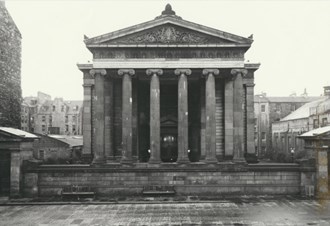
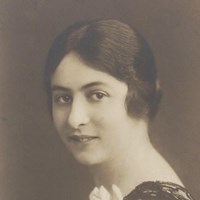 Trailblazers: Women in Science and Medicine in the Archives
Trailblazers: Women in Science and Medicine in the Archives
